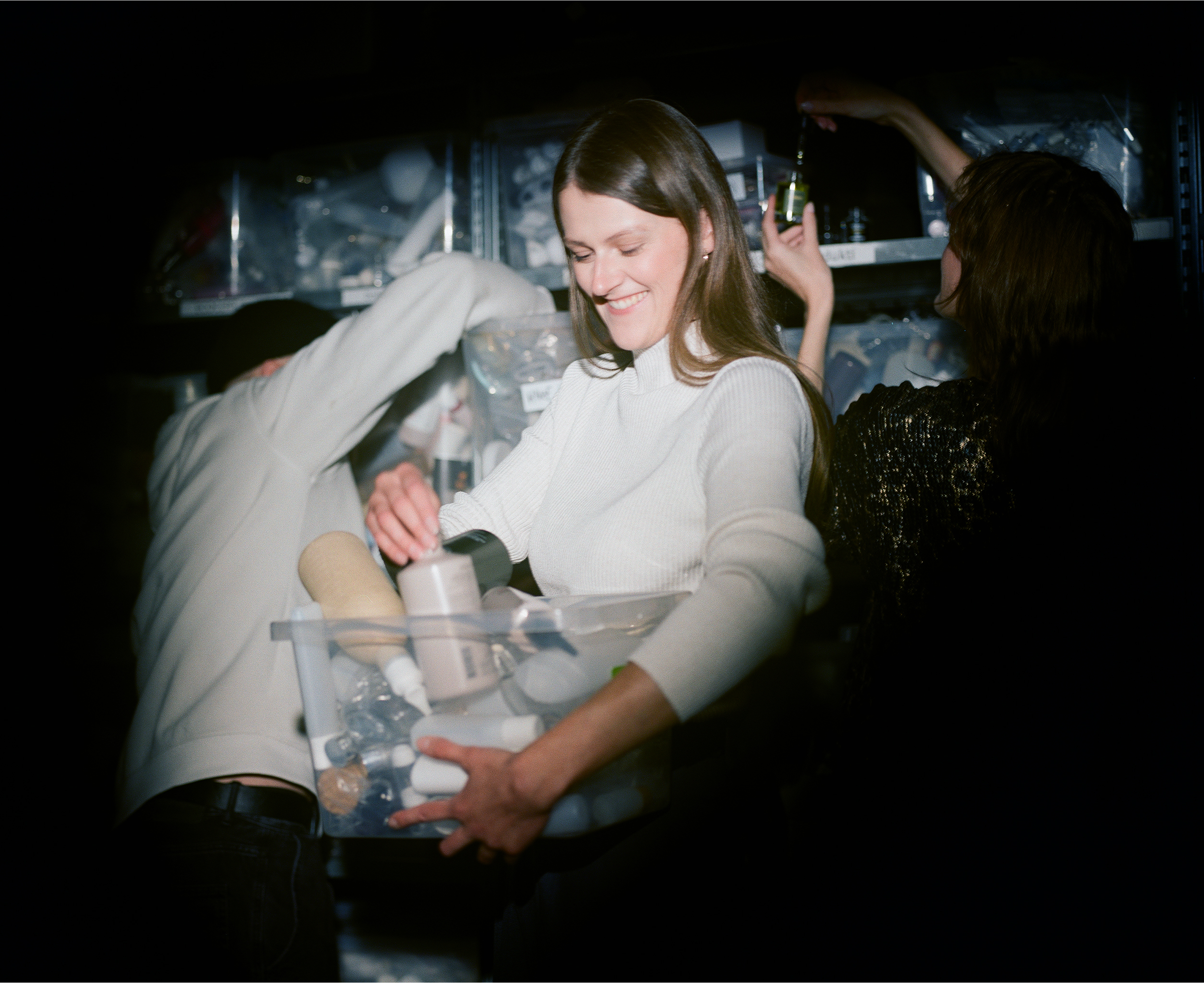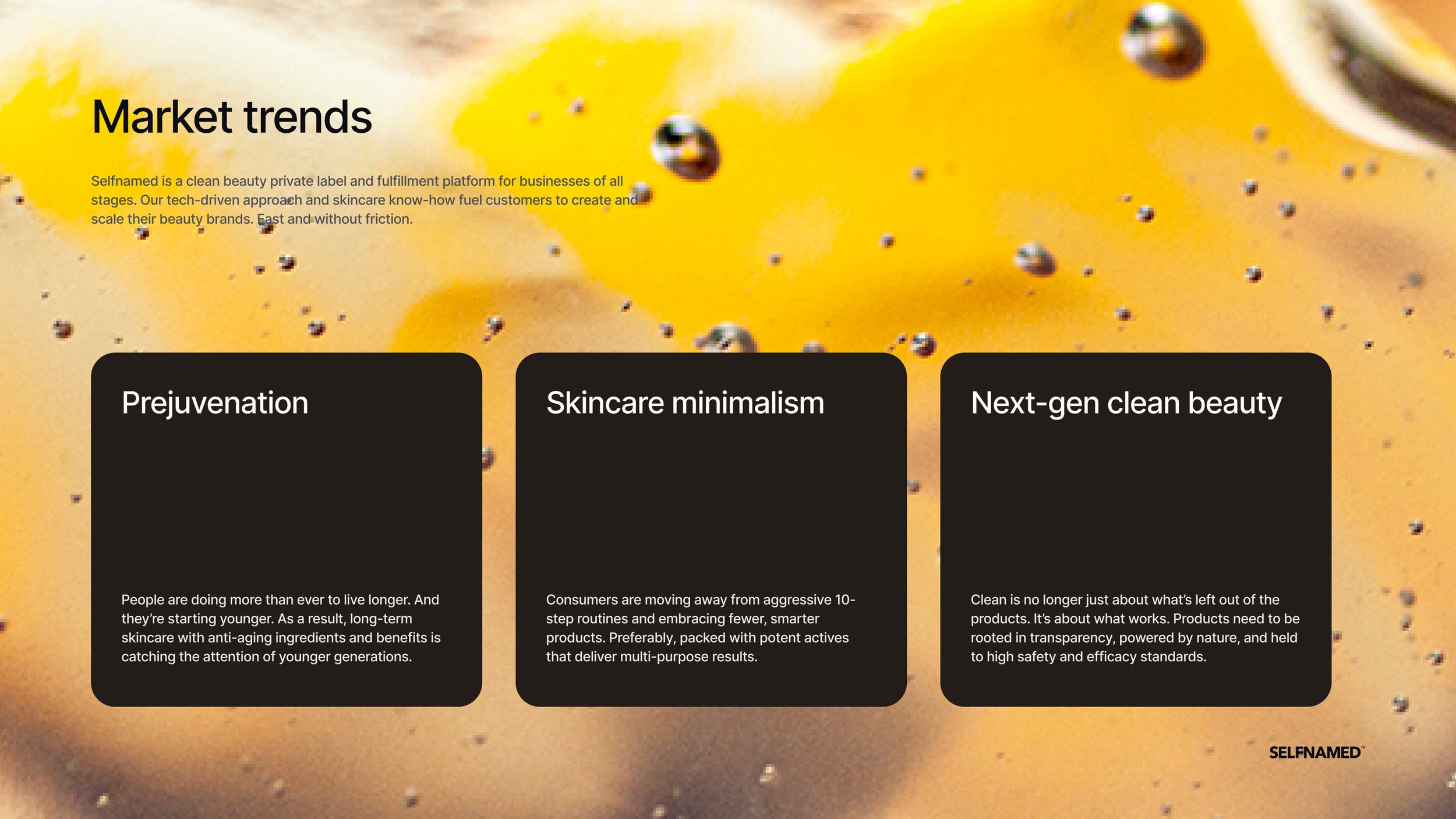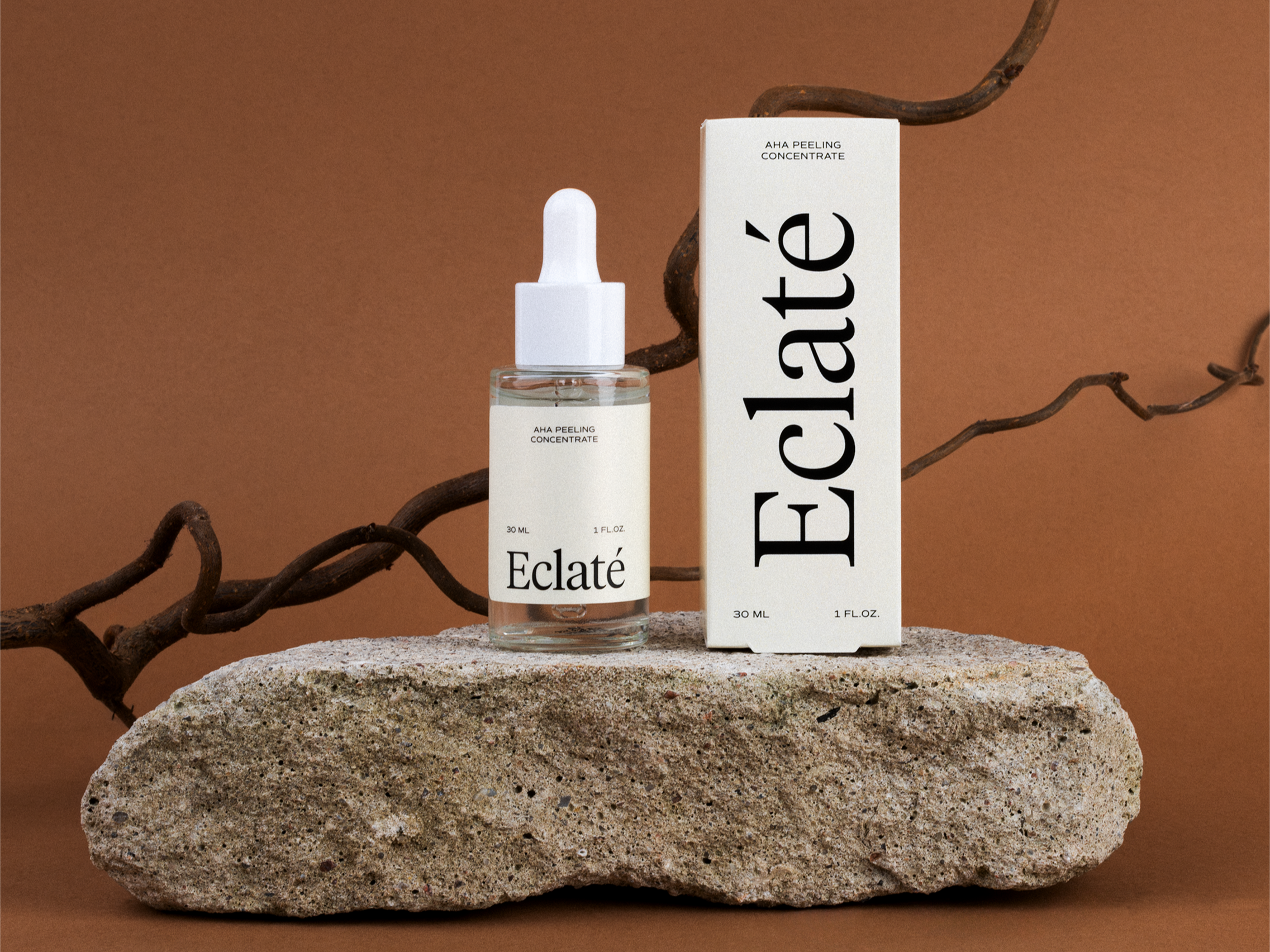Beyond the beauty business with Selfnamed’s CEO
Building a business from an idea is an exciting journey, but it’s a path full of challenges. We sat down with Anete Vabule, Selfnamed's CEO and Co-Founder, to hear about her journey into the beauty industry and the founding story of Selfnamed. We also discussed the latest trends, business challenges, and opportunities shaping the future of beauty.
To start, let’s talk a little bit more about how you came to work in the beauty industry. I know you started as a marketing intern at Madara Cosmetics, how did you choose that?
This was back in my first year of university. We had guest lecturers and one of them was the founder of Madara Cosmetics. She was responsible for brand and marketing, and I was mesmerized by her and the company.
In 2008, there weren't that many companies that wanted to change something. It felt like the beauty industry was only for big corporations. But Madara was starting something new and was willing to challenge the status quo, and that really excited me.
So when I had to do an internship, I wrote to the founder of Madara, and she accepted me for the position. I was excited that they did things differently, and over the years, I've realized that's part of my core, seeing a problem and trying to fix it.
Take us back to the beginning of Selfnamed. What was the initial idea that led to the founding of Selfnamed?
After being at Madara almost from the very beginning and seeing how it was built, I understood that the work required to build a cosmetics brand is enormous. The barriers for new brands to enter the market were huge. You had to become a specialist in chemistry, regulations, logistics, and more. I thought that was wrong. Brand owners are the ones who know their clients and brand the most, and that's where they should focus, not on all the technical stuff like regulations.
The private label industry also had its problems back then. The first thing was communication, which happened only by email, and you sometimes couldn't even see the products. Then there were the funds – the minimum order quantities were huge and in most cases they still are. The formulas also seemed outdated and full of ingredients that could be replaced by natural ones. We wanted to fix that and see if it could be done using technology. I think we have succeeded.
You mentioned some of the problems in the beauty industry that entrepreneurs and the private label manufacturers had. Has that mission to fix these problems changed over time?
At first, we were fixing accessibility. We built technology that makes it easy to launch a skincare line for anyone who wants to get into the beauty business. We started with offering clean beauty products with natural, vegan ingredients. We made it easy to start without big investments and huge stock.
Over time, we've realized that we're not only offering better products on an easy-to-use platform, but we're actually helping to build their brand. We expanded our services to help with designs for our clients' brands, started offering mockups of the products, and also provided educational materials through our blog and webinars.
What do you see as the responsibility of private label manufacturers in the beauty industry today? And in your opinion, what can be done better?
I see private label manufacturers as gatekeepers to what comes on the market, and I think it's a huge responsibility. It's also important for private label suppliers to be really transparent about their processes.
The main thing is to make sure that the formulas are effective and try to incorporate as many sustainable ingredients as possible. It's important because to compete in a very overcrowded market, the formulas need to be effective. This is something that we also understand at Selfnamed, and we pay a lot of attention to making sure that our clients have what they need to be successful from the very start.
I hear that sustainability practices in product development are very important to you.
I think being sustainable is the new normal. It's not only about clean formulas but also about building a company that is value-based and thinks about how it affects the environment. It also considers how its employees are feeling and how the company is governed. It's a bit bigger than just the product itself.
Would you say sustainability is something that private label brands can achieve easily?
It’s easy to achieve sustainability if a company starts with that mindset from the very beginning, like Selfnamed did. I was often asked if it was hard to become a sustainable company, and it was difficult to answer because it was never hard. It was just a part of the company from the very beginning, and employees were passionate to improve things.
But if a company is not sustainable at the moment and it's a struggle to convince managers or the board that sustainability is needed, you can approach it differently. So, I always emphasize that sustainability is not only about “being green”. It's also about being effective. Sustainability affects, for example, the amount of energy you use and that in return affects the amount of money you spend on it. So it's a direct improvement in the profit and loss statement and that's something that board members always like to hear.
So, either you start from the beginning with sustainable practices, or incorporate them later, it’s beneficial in more ways than one.
In the early days of building the company, was there ever a moment you wanted to give up, and if so, what kept you going?
I think we thought it was hard every other day. But two things kept me going. First, definitely the team. It's so inspiring to work with such professional, dedicated, and active people. It makes the process nice and enjoyable, even when it's hard.
The second thing is our clients. When our first clients gave us such positive reviews and said how much we had helped their brands grow, that was really inspiring. I realized that what we offered was quite unique and that the audience just needed time to get used to it.
And the best part is that our team builds strong relationships with our customers. So much so that they become a part of our decision-making. They tell us what they need to expand their business and what features would be helpful. We even started a Beta Testers program to give them the opportunity to directly give us feedback and test the new features so we can work together better.
So, yes – the team, the clients, and my vision for the future of the industry all helped me keep going.
What do you see as Selfnamed’s unique value proposition today?
I would say that we are not just a private label supplier who uses technology to make the industry more accessible. We are building the entire infrastructure for the next generation of beauty brands. We give the same quality, compliance, and speed that previously was only accessible to the industry giants.
I also think what's unique to Selfnamed is that we offer the most customization possible in a market where standing out is important. And we are constantly thinking of ways to offer more and more possibilities in this area. Of course, the sustainability aspect is also something that I think not everyone offers.
We encompass all of these things: speed, high-quality products, lots of customization, and sustainability, all under one roof. One of the things you get with Selfnamed is the ability to launch your brand quickly. Another thing where we are a good partner is to create trust between the brand and the end-user because our products deliver the necessary results.
What are some of the consumer trends that have come and gone since Selfnamed was founded, and what trends or industry shifts have become permanent?
I've noticed that for every trend, there is also an emerging anti-trend. For example, minimalism is coexisting with maximalist skincare routines. Using gentle products exists alongside very hardcore active ingredients. But I think the want for science-backed, efficient products, and clean formulas is a permanent change that has happened over the past few years. I don't think that is going away.
All these trends over the years of course impact the perception of what is beautiful. What is beauty for you?
When I was younger, I thought that beauty was more about trends and aesthetics. Over the years I realized that it's more about aligning how you feel inside and how you present yourself outside. It's about each person and how they feel, how they present themselves.
For example, if using makeup is your self-expression, that will make you beautiful. If you want to go makeup-free, you are still beautiful because you are aligned with how you want to present yourself. You're authentic.
That is a wonderful way to view beauty. Continuing on trends, we're seeing quite a hype around founder-led brands and personal branding these days. What is your perspective on this trend, and how can brands build a legacy that is bigger than their founder?
The good thing about founder-led brands is that they create authenticity, which is very important today. People love authentic stories.
The problem might be that the whole brand becomes about this one person, but for long-term success, I think it's important to shift the focus more towards the brand’s values or a community. The brand should be anchored to a bigger cultural movement and values, like sustainability or inclusivity, so that it can outlive the founder’s presence.
Consumers are more educated than ever, and reports show they're focused on product efficacy. How have you seen this shift influence product development and marketing in the last few years?
This shift has definitely influenced the industry. A product should do its work, and it's not sustainable to just talk about a product if it doesn’t work. Companies are also talking more about visible proof and results. I remember 15 years ago seeing advertisements where the formula was tested on five people and they were claiming amazing results.
Now, they're testing on hundreds of people in clinical trials. The consumer is actually a great companion in this industry because their demands make manufacturers and beauty entrepreneurs become better.
What trends are you most excited about right now, and how can beauty entrepreneurs prepare their brands to capitalize on them?
I really like this trend about the focus on preventive care rather than corrective care, which was also mentioned in one of the Selfnamed’s Instagram posts. Prejuvenation, it's about taking care of your skin before the actual problem has appeared. I recently read the same thing is happening in the health industry. We are not going to the doctor when there's a problem but we are actually going to the doctor to check if there might be a possibility for a problem and fixing it preventively. That's my favorite lately.
But to be honest, I would recommend brands not to chase every micro trend. I would recommend focusing on values that will matter also in 10 years like efficacy, sustainability, inclusivity. I think following trends should just be the topping on the cake but the foundation should be really based on these values.
Ksenija Kumačova, a certified pharmacist, on prejuvenation and other consumer trends.
Where do you see the beauty industry is heading? How Selfnamed fits in that future?
I think the market will become more fragmented, but also more accessible. We will see a lot of niche brands coexisting with beauty giants. These niche brands will each speak to specific communities. I think people are expressing themselves more and trying to differentiate themselves from others. Selfnamed’s role is to support these niche brands and make sure they have all the tools and products they need to launch, and everything to scale.
What advice would you give a beauty entrepreneur who is just starting out and feeling overwhelmed by the competition?
The market might seem saturated, but it’s actually fragmented. This means there’s an opportunity for a lot of brands to enter because you don’t need to win everyone over, like the beauty giants. You need to win over a specific community. So, I would recommend finding that underserved audience or problem you want to solve, creating a story and a brand around it, and then talking about it relentlessly.
I would also say, don't be afraid to start another brand if the first one doesn't work out. With technology, it's that easy and cost-efficient. Try three or five brands and see which one works best for your community.
What is one piece of strategic advice you believe every beauty brand owner should keep in mind for long-term success?
Quite simple, don't build your brand around trends. Trends are important, but the main thing is to build your brand around a community or a problem that you see. Your customer won't remember every trendy product or every campaign, but they will remember if you stand for something real and you talk authentically. That is what creates loyalty, and that is what can't be copied. You won't just be just building a brand, you will be building a successful business.
Frequently Asked questions
-
Selfnamed provides technology that simplifies the process by offering a wide range of clean, effective, and sustainable products that are ready to be branded. Additionally, Selfnamed's platform offers extensive customization options, quick launch times, and the ability to scale from small batches to bulk orders without the need for large upfront investments.
-
Selfnamed’s uniqueness lies in the holistic approach to brand building. Selfnamed offers an entire infrastructure for the next generation of beauty brands. This means – offering the same quality, compliance, and speed previously only available to industry giants, while also prioritizing sustainability and extensive customization. This allows new entrepreneurs to create a unique and authentic brand that can stand out in a fragmented market.
-
Selfnamed’s CEO Anete Vabue says – thekey is to build a brand around a community or a problem you see in the world, rather than chasing fleeting trends. A customer will remember if you stand for something real and authentic, which creates loyalty, something that can't be copied. For Anete, the most important values for long-term success are efficacy, sustainability, and inclusivity, which she sees as the "foundation" of a great brand.
-
The great thing about founder-led brands is the authenticity they create, which customers love. However, for long-term success, a brand cannot be solely about one person.
To build a lasting legacy, a brand should shift its focus toward broader values or a community. By anchoring the brand to a larger cultural movement like sustainability, inclusivity, or innovation, it can outlive the founder’s presence. That will create a stronger, more enduring connection with the brands audience.
Must read











